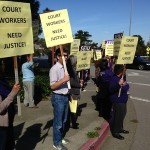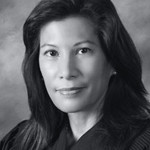Heads Up: New Court Committees Target Budget, Access
2014 L.A.S.C. Elections Featuring D.A. Hopefuls
For more about the election, and other candidates, check out the report here.
2014 Judicial Election Cycle Gets Started
Marin County Superior Court on ‘losing end’ of budget reallocations

Photo: Marin Independent Journal as part of their report on 10/25/13 “Marin court employees, raiseless for five years, rally for better pay”
According to a report by Gary Klien of Marin Independent Journal, dozens of court employees in Marin County, with representatives of their union, SEIU Local 1021, rallied outside the courthouse late last month to campaign for better pay, benefits and dispute resolution after five years of frozen wages.
Doesn’t look like this will be resolved anytime soon…Court employees are seeking a $4,000 one-time payment, while Marin Superior Court, which is run by the state judicial branch, is offering a one-time payment of $725.
According to the Marin IJ report, Kim Turner, the court’s chief executive officer, said the entire state judiciary has been underfunded for years and that things are not going to get easier in the next five years. Turner explained that it is because the state has adopted a new allocation process that will send more of the limited resources to courts that are perceived, based on caseload calculations, to be needier.
“Marin is on the losing end of that bargain,” Turner said. Read or view the story here.
Petty Politics Detailed In Former Chief Justice’s Book
San Bernardino Lawyers Brace For Their ‘Reorganization’
Chief Justice Notices ‘Two-Tiered’ Court System
Anyone seeking evidence that California has created a two-tier system that denies justice to lower income residents can just ask the state’s chief justice. Echoing a host of earlier comments, Tani Cantil-Sakauye told KQED News that “The truth is, those who can will use other, private alternatives… but those of us who need to go to the court, who don’t have those resources, find ourselves frankly getting a second system of justice.”
